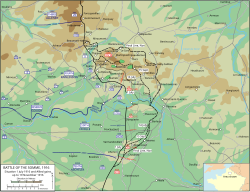| Battle of the Ancre | |||||||
|---|---|---|---|---|---|---|---|
| Part of the Battle of the Somme of the First World War | |||||||
 Battle of the Somme 1 July – 18 November 1916 | |||||||
| |||||||
| Belligerents | |||||||
|
|
| ||||||
| Commanders and leaders | |||||||
|
Douglas Haig Hubert Gough Ferdinand Foch |
Crown Prince Rupprecht of Bavaria Max von Gallwitz Fritz von Below | ||||||
| Strength | |||||||
| 12 divisions, 1 brigade | 4 divisions | ||||||
| Casualties and losses | |||||||
| c. 22,000 | 1–18 November, c. 45,000 including 7,000 prisoners. | ||||||
The Battle of the Ancre (13–18 November 1916), was fought by the British Fifth Army (Lieutenant-General Hubert Gough), against the German 1st Army (General Fritz von Below). The Reserve Army had been renamed the Fifth Army on 30 October. The battle was the last of the big British attacks of the Battle of the Somme. After the Battle of Flers–Courcelette (15–22 September) the Anglo-French armies tried to press their advantage with smaller attacks in quick succession, rather than pausing to regroup and give the Germans time to recover. Subsequent writers gave discrete dates for the Anglo-French battles but there were considerable overlaps and continuities of operations until the weather and supply difficulties in mid-November ended the battle until the new-year.
The British attack was to fulfil complementary objectives. Political discontent in London would be muted by a big victory, as would doubts of British commitment by its allies and British loyalty to the Chantilly strategy of 1915 would be upheld. The capture of Beaumont Hamel and Serre would go some way to redeem the failure of 1 July and obtain ground on which the British would have a tactical advantage. The attack was the largest in the British sector since September and had a seven-day preliminary bombardment, which was twice as heavy as that of 1 July. The capture of Beaumont Hamel, St Pierre Divion and Beaucourt threatened the German hold on Serre further north. Edmund Blunden called the battle "a feat of arms vieing [sic] with any recorded. The enemy was surprised and beaten". Four German divisions had to be relieved due to the number of casualties they suffered and over 7,000 German troops were taken prisoner.
© MMXXIII Rich X Search. We shall prevail. All rights reserved. Rich X Search
